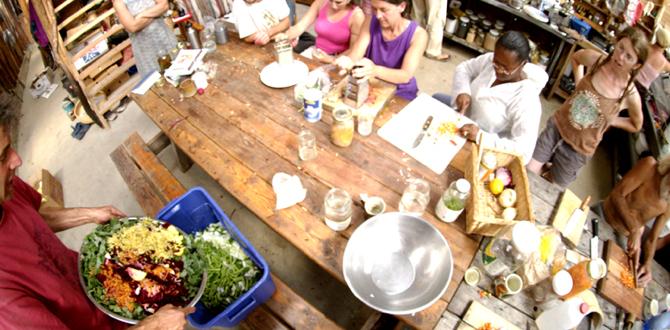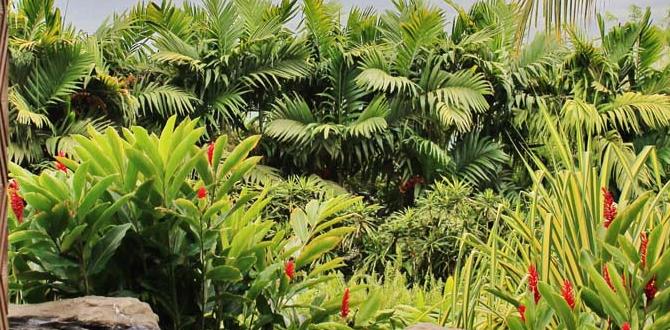Planning a trip to Accra? This 3-day itinerary is your shortcut to experiencing the city’s vibrant culture, rich history, and delicious food. We’ve packed it with must-see sights and hidden gems, ensuring a fun and stress-free adventure. Get ready to explore Accra with our easy-to-follow guide!
Welcome to Accra, Ghana’s energetic capital! This city is a dazzling mix of old and new, where ancient traditions blend seamlessly with modern life. From bustling markets to poignant historical sites, Accra offers an unforgettable experience. Planning can feel a bit overwhelming, especially if it’s your first visit. But don’t worry, we’ve crafted a 3-day itinerary that balances iconic landmarks with local flavor. It’s designed to be beginner-friendly, so you can soak it all in without feeling rushed. Get ready for an amazing journey as we guide you through the heart of Accra!
Your Ultimate Accra 3-Day Itinerary: Essential Fun
Accra is a city that truly awakens the senses. It’s a place of deep history, vibrant art scenes, and mouthwatering cuisine. For travelers seeking a focused yet fulfilling experience, a 3-day trip allows for a delightful immersion into what makes Accra so special. We’ve designed this itinerary with ease and enjoyment in mind, covering the essentials without feeling rushed. Think of it as your perfect introduction, designed to spark a love for this incredible West African hub.
This guide is perfect for solo adventurers, families, or anyone looking for practical travel tips. We’ll cover everything from historical insights to culinary delights, ensuring your visit is both enriching and fun. Consider this your stress-free blueprint to discovering Accra’s essential charm.
Day 1: History, Culture, and Coastal Breezes
Your first day in Accra focuses on understanding its rich past and enjoying its dynamic present. We’ll start with a deep dive into Ghana’s history and then unwind by the sea.
Morning: A Journey Through Ghana’s Past
Begin your exploration at the Independence Square (Black Star Square). This iconic landmark symbolizes Ghana’s freedom from colonial rule. It’s a vast open space, perfect for a reflective start to your day. Imagine the cheers of a newly independent nation as you stand where history was made.
Next, immerse yourself in the solemn history at the Kwame Nkrumah Mausoleum and Memorial Park. This is dedicated to Ghana’s first president and a pivotal figure in African independence movements. The museum inside offers a detailed look at his life and work. It’s an essential stop for understanding Ghana’s journey.
For a deeper historical perspective, visit the National Museum of Ghana. Though its exhibitions can vary, when open, it houses a remarkable collection of Ghanaian artifacts, sculptures, and historical objects that tell the story of the nation’s heritage. Check their updated opening status before your visit.
Lunch: Taste of Traditional Ghana
For lunch, seek out a local restaurant serving traditional Ghanaian dishes. Look for places offering:
- Jollof Rice: A flavorful rice dish cooked in a rich tomato-based sauce.
- Waakye: Rice and beans cooked together, often served with a flavorful stew.
- Fufu: A staple dish made from pounded cassava and plantains, served with various soups.
Many local eateries offer these delicious options. Don’t be afraid to ask vendors for recommendations on what’s fresh and popular!
Afternoon: Coastal Charm and Local Crafts
In the afternoon, head to Jamestown, Accra’s historic fishing district. Wander through its colorful streets, observe the bustling fishing activities, and admire the old colonial architecture. Jamestown also boasts a vibrant street art scene, making for fantastic photo opportunities.
While in Jamestown, you can visit the Jamestown Lighthouse for panoramic views of the coastline. For a dose of authentic local culture and vibrant energy, exploring the Jamestown Fish Market is a must. Remember to be respectful when photographing people and their activities.
After Jamestown, make your way to the Art Centre (also known as Arts Centre). This is the perfect place to find unique souvenirs. You’ll find an array of Ghanaian crafts, including wood carvings, beads, kente cloth, and leather goods. It’s a great spot to practice your bargaining skills and take home a piece of Ghana.
Evening: Sunset and Seafood
As the day winds down, head to Labadi Beach or Bojo Beach for a stunning sunset. These beaches are popular spots for locals and tourists alike. You can enjoy the sea breeze, listen to local music, and savor delicious fresh seafood from beachside vendors.
For dinner, enjoy more of Accra’s renowned seafood. Many restaurants lining the coast offer freshly grilled fish, calamari, and prawns. This is a perfect way to end your first day, with the sound of the waves and the taste of the ocean.
Day 2: Art, Education, and Modern Accra
Day two is dedicated to exploring Accra’s thriving arts scene, learning opportunities, and experiencing its modern, pulsating heart.
Morning: Artistic Expressions and Learning
Start your day at the Artists Alliance Gallery. This impressive gallery showcases a vast collection of contemporary and traditional Ghanaian art. It’s a fantastic place to appreciate the talent of African artists and perhaps find a unique piece to take home.
Next, engage your mind at the Centre for National Culture (Arts Centre) again, but this time with a focus on understanding the crafts. You can learn about the processes behind kente weaving or batik making. Some workshops might even offer brief demonstrations. For a more structured learning experience, look into art studios that offer short classes or workshops.
Lunch: A Culinary Adventure
Accra’s food scene is diverse. For lunch, consider exploring areas like Osu or East Legon for a wider range of dining options. You can opt for:
- International Cuisine: Accra has a growing number of restaurants offering Italian, Lebanese, and other global flavors.
- Local Delicacies: Try dishes like Banku and Tilapia (fermented corn dough served with grilled tilapia) or Kenkey (fermented corn dough steamed in maize husks or plantain leaves).
Consider trying a popular spot in Osu for a lively lunch atmosphere.
Afternoon: Modern Landmarks and Green Spaces
Visit the Mmofra Adobea (Children’s Art & Craft Village) if traveling with family or if you appreciate creative spaces. It’s a place designed to inspire young minds and showcase their artistic creations, offering a different perspective on Ghanaian creativity.
For a moment of peace in the city, explore the Aburi Botanical Gardens (a day trip is possible, or a focused 2-3 hour visit if you start early). While slightly outside the city center, these lush gardens offer a tranquil escape, beautiful flora, and stunning views. Alternatively, enjoy the smaller but accessible Haatso Overlook for lovely city views without leaving Accra.
If you’re interested in understanding modern Ghanaian life and enterprise, explore the commercial hubs like the areas around the Accra Mall or the shopping districts in Osu and Cantonments. This offers a glimpse into contemporary Ghanaian commerce and lifestyle.
Evening: Accra Nightlife and Dining
Accra’s nightlife is vibrant and diverse. For dinner, explore the Osu Oxford Street area, known for its variety of restaurants, bars, and clubs. You can find anything from upscale dining to casual pubs.
Consider experiencing:
- Local Pubs: Enjoy local beers and spirits while soaking in the atmosphere.
- Live Music Venues: Some venues feature live Ghanaian music, offering a chance to dance and immerse yourself in the local rhythm.
- Rooftop Bars: Enjoy a cocktail with a view of the city lights.
For a more relaxed evening, enjoy a final delicious dinner at a restaurant offering authentic Ghanaian cuisine or international fare. The options are plentiful and cater to every palate.
Day 3: Wildlife, Markets, and Departure
Your final day combines a touch of nature with vibrant market experiences before you prepare for departure.
Morning: Wildlife Encounters and Local Markets
Start your day with a visit to the Accra Zoo, located within the Achimota Forest Reserve. It’s a great opportunity to see native West African animals and enjoy a bit of greenery within the city. The reserve itself offers a peaceful environment for a morning stroll.
Alternatively, for a unique cultural shopping experience, head to the Makola Market. This is one of Accra’s largest and most bustling markets. It’s a sensory overload in the best way possible – a vibrant hub where you can find almost anything from fresh produce and spices to textiles and household goods.
Be prepared for crowds and engage with vendors. Remember to keep your belongings secure, much like when visiting any large market, and consider traveling with accessible personal care items like small, discreet pouches for your essentials, which can be very helpful in crowded environments.
Lunch: Market Flavors or Casual Bites
If you’re at Makola Market, you can sample some delicious local street food. Many vendors sell affordable and tasty treats like fried plantains, grilled corn, or local snacks.
If you prefer a more comfortable setting, find a nearby restaurant or café. Many establishments offer quick, casual meals perfect for a final Ghanaian lunch before heading to your next destination.
Afternoon: Last-Minute Souvenirs and Departure Preparations
Spend your final afternoon picking up any last-minute souvenirs or revisiting a spot you particularly enjoyed. The Friday Market (if your trip aligns) or smaller craft stalls offer opportunities for final purchases.
If you have time, and depending on your flight schedule, you might consider a relaxing massage or simply enjoying a final coffee at a local café. It’s also a good time to start packing and ensuring you have all your travel documents and essentials ready for your departure. For those who may need them, having easily accessible personal care items, such as discreet adult diapers or child diapers, can make the transition to travel and airport procedures much smoother and more comfortable.
Evening: Farewell Dinner and Departure
Enjoy a final Ghanaian dinner. Choose a restaurant that offers a cuisine you haven’t tried yet, or revisit a favorite from your trip. Many hotel restaurants also offer excellent dining experiences often with live entertainment.
Depending on your departure time, head to Kotoka International Airport (ACC) for your flight. Allow ample time for travel to the airport and check-in procedures.
Essential Travel Tips for Accra
To make your 3-day trip to Accra as smooth and enjoyable as possible, here are a few essential tips:
- Transportation: Taxis are readily available, but agree on a fare before starting your journey. Ride-sharing apps like Uber and Bolt are also popular and can be more convenient. For shorter distances, consider tro-tros (shared minibusses), though these can be a bit daunting for first-time visitors and require some understanding of local routes.
- Currency: The local currency is the Ghanaian Cedi (GHS). While major hotels and some larger businesses accept credit cards, cash is essential for markets, smaller vendors, and taxis. ATMs are available in most urban areas.
- Language: The official language is English, making communication relatively easy for most tourists. However, various local languages are spoken, with Twi being one of the most common.
- Health and Safety: Consult your doctor about recommended vaccinations and malaria precautions before traveling. Drink bottled water. Be aware of your surroundings, especially in crowded areas, and keep valuables secure.
- Packing Essentials: Light, breathable clothing is a must due to the tropical climate. Sunscreen, a hat, insect repellent, and comfortable walking shoes are also highly recommended. If you or a traveling companion requires them, ensure you have a sufficient supply of personal care items like adult or child diapers for constant comfort and peace of mind during your explorations.
Accra 3-Day Itinerary: Sample Packing List
Packing smartly ensures comfort and preparedness. Here’s a sample list tailored for Accra, keeping in mind different needs:
| Category | Essential Items | Optional Items |
|---|---|---|
| Clothing | Lightweight shirts and tops Cotton trousers or skirts Comfortable shorts Swimsuit (if visiting beaches or hotels with pools) A light jacket or cardigan for evenings Modest clothing for visiting cultural or religious sites |
A stylish dress for evenings out Activewear for any planned hikes or activities |
| Footwear | Comfortable walking shoes or sandals Flip-flops or casual sandals |
Dressier shoes for evenings |
| Health & Comfort | Sunscreen (high SPF) Insect repellent Hand sanitizer Any personal medications Motion sickness medication (if needed) Discreet adult diapers or child diapers (for extended outings or travel flexibility) |
After-sun lotion Small first-aid kit |
| Documents & Money | Passport and visa (if required) Flight and hotel confirmations Credit/debit cards Cash (Ghanaian Cedis and some USD for emergencies) Copies of important documents |
Driver’s license (if planning to drive, though not recommended for tourists unfamiliar with local conditions) |
| Electronics | Mobile phone and charger Universal travel adapter (Ghana uses Type G plugs, 230V) Portable power bank |
Camera and accessories E-reader |
| Miscellaneous | Reusable water bottle Small backpack or day bag Sunglasses Hat or cap Any comfort items for travel (e.g., travel pillow, book) |
Binoculars Small phrasebook (though English is widely spoken) |
Understanding Personal Care Needs While Traveling
For travelers who require personal care assistance, such as using adult diapers or child diapers, planning ahead is key to ensuring comfort and confidence throughout your journey. Accra is a vibrant city with many attractions, and you’ll want to be able to explore without concern. Modern personal care products are designed for discretion and absorbency, allowing for full participation in activities.
When packing, ensure you have an adequate supply for the duration of your 3-day trip, plus a little extra. Consider carrying a small bag with essentials for quick changes, which can be easily stored in a daypack. This proactive approach ensures that your travel experience in Accra is focused on enjoyment and discovery, not on potential worries. Organizations like the U.S. Food and Drug Administration (FDA) provide general guidance on medical device usage, which can be useful for understanding product functionalities and ensuring appropriate use for health and comfort.
Accra’s Culinary Delights: Must-Try Foods
Ghanaian cuisine is flavorful, hearty, and a significant part of any visit. Here are some dishes you absolutely must try during your 3-day itinerary:
- Jollof Rice: The quintessential West African dish. Ghana’s version is known for its rich, spicy flavor, often cooked with chicken, beef, or fish.
- Fufu: A soft, dough-like staple made from pounded cassava and plantain. It’s typically dipped into various soups and stews, such as groundnut soup or light soup.
- Banku and Tilapia: Banku is a fermented corn and cassava dough, often served grilled or fried with a spicy tilapia fish. It’s a popular coastal delicacy.
- Waakye: A flavorful dish of rice and beans cooked with sorghum leaves, giving it a distinctive color. It’s usually served with various accompaniments like shito (spicy pepper sauce), gari (granulated cassava), fried fish, or meat.
- Kenkey: Fermented maize dough that is steamed and wrapped in maize husks or plantain leaves. It has a slightly sour taste and is often eaten with fried fish, stew, or shito.
- Red Red: A vegetarian dish made with black-eyed peas stewed in palm oil and tomatoes, served with fried plantains. It’s hearty and delicious.
- Shito: A spicy black pepper sauce made from chili peppers, ginger, onions, and dried fish or shrimp. It’s a condiment used in many Ghanaian dishes.
Don’t hesitate to try these dishes from local restaurants and street vendors – they offer an authentic taste of Ghana!
Sustainable and Responsible Tourism in Accra
As you explore Accra, consider ways to travel responsibly:
- Support Local Businesses: Eat at local restaurants, buy crafts directly from artisans, and use local guides. This ensures your tourism spending benefits the community.
- Respect Local Customs: Be mindful of dress codes, especially when visiting religious sites or rural areas. A polite demeanor and asking permission before taking photos of people








